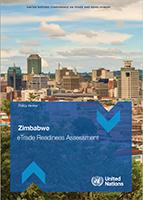
The eTrade Readiness Assessment (eT Ready) of Zimbabwe is the thirty-ninth conducted by UNCTAD and the twentieth in Africa. It provides an in-depth review of Zimbabwe’s e-commerce ecosystem and offers recommendations to navigate the country’s digital transformation journey and meet its development aspirations.
The main findings are presented below by policy area:
- Digital economy features prominently in the National Development Strategy (2021-2025) and Vision 2030. The e-government portal, ZimConnect, lays the foundation for digital Zimbabwe, but fragmented government systems hinder data integration and more efficient delivery of e-government services. E-commerce is mostly urban and informal, driven by the diaspora and remains largely informal. The lack of a dedicated national e-commerce strategy, effective governance mechanisms and systems to measure e-commerce activities is a major gap for designing and implementing e-commerce enabling initiatives.
- Zimbabwe has made strides in creating an ICT development framework and promoting the population’s access to the Internet, for example via the more than 200 Community Information Centers spread across the country. Still, the ICT sector faces various structural challenges, limited competition and a costly operating environment. Addressing the significant urban/rural divide, issues with last-mile connectivity and affordability concerns requires a balanced mix of inclusive policy interventions and increased investments to support the development of a thriving digital ecosystem.
- The logistics sector in Zimbabwe is weakly structured and largely dominated by informal service providers. Efforts are needed to promote multi-modal logistics services and facilities, last-mile delivery solutions and a dense network of pick-up centres. The automated customs management system (ASYCUDA World), e-single window and one-stop cross-border posts, are fostering paperless trade. However, better coordination among agencies and further reforms in the area of trade facilitation are required to further promote trade and e-commerce.
- Zimbabwe’s commitment to financial inclusion and widespread adoption of mobile money have resulted reducing the rural/urban/gender financial inclusion gaps. Multiple regulatory interventions led by the Reserve Bank of Zimbabwe have enabled interoperability in 2020 with the establishment of a national switch platform, ZimSwitch. Efforts are underway to promote cross-border integration of retail payments at the regional and continental levels and expand payment services that could serve as enablers of e-commerce and the digital economy. Still, major challenges remain due to macroeconomic uncertainties, taxation of money transfers and trust issues on financial transactions.
- Zimbabwe needs a comprehensive legal framework for domestic and cross-border e-commerce. Existing laws (Consumer Protection Act, Cyber and Data Protection Act) contain relevant provisions favouring transparency and fair business practices but also focusing on security rather than commercial aspects. Intellectual property laws exist but their application in the digital realm is to be assessed. Digital identity and electronic signatures legislations lack traction, public procurement is moving to digital platforms but its regulatory framework doesn't promote the sourcing of national ICT providers. The e-commerce taxation framework exists but is weakly implemented. Adopting laws based on UNCITRAL models would help create a sound legal framework. More awareness and education on existing provisions are also recommended. Strengthening enforcement agencies and creating a user-friendly e-commerce dispute resolution system, especially for cross-border transactions, would also benefit Zimbabwe.
- Zimbabwe has a strong human capital base, but few people and MSMEs possess productive digital skills. ICT skill gaps among teachers and poorly equipped schools hinder ICT integration in education. The Government is driving major programmes to address skills mismatches and align education with labour market demands. More targeted efforts are needed for start-ups, MSMEs, and women-led businesses in new technologies, logistics, cross-border e-commerce, and online shop management. Measures for strengthening business support infrastructure, fostering partnerships, and providing incentives (e.g., via a Start-Up Act) are recommended.
- Despite a diversified financial sector, private sector financing in Zimbabwe is limited. Loans to women, MSMEs, and youth account for only 3-4 per cent of total banking loans. Digital MSMEs face challenges like high business costs, complex procedures, limited skills, and weak governance, lack of collateral and credit history, and they are mostly self-funded. Venture capital and alternative financing remain marginal, needing better policies to support start-ups and digital businesses.
The Zimbabwe eT Ready provides a broad set of key policy recommendations aiming at fostering integration into the regional and global digital landscape and it also lays the foundation for the development of a National E-commerce Strategy.
This assessment was made possible through the financial support of the Government of the Republic of Korea and the E-commerce and Digital Economy Programme Core Donors (Germany, Switzerland, Sweden, and the Netherlands).


